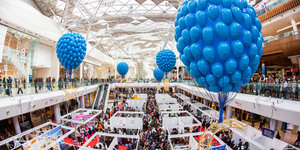I'll make a bet with you: the first thing that pops into your head when I say the words 'social inclusion' is something about community grants for some or other minority group, right?
For most people this stereotype is a massive turn-off. Your average Londoner is someone who's just trying to get by; they don't have racist views, they're unlikely to feel like they need a community grant — well, apart from some cash help with the rent — and they aren't from a privileged background. And they're exactly the people in the sights of Matthew Ryder — deputy mayor of London with special responsibility for social integration, social mobility and community engagement.
His job, gushes the press release about his appointment, is "to ensure Londoners of every gender, ethnicity, faith, culture, age, sexuality and socio-economic background don't just live side by side, but live truly interconnected lives."
It sounds like a Sisyphean task.

Reading below the line comments, social media 'conversations' or just watching TV news reports, there's a feeling we've never been as divided as a nation; and no matter what political persuasion you are, the global narrative feels unrelentingly schismatic.
Where the hell do you start, trying to bring together a city of 8m people, many of whom have not only different political views to the rest of the country but each other (60/40 split over Brexit is not exactly the paragon of a united city)?
The short answer is: there is no short answer.
But over coffee in his home neighbourhood of Brixton, north London-born barrister Ryder enthuses about developing communities through volunteering, the power of culture to bring people together, the unifying nature of sports.
And while some of those concepts might sound a little wishy washy, he's acutely aware of the importance that income inequality, especially around housing, plays in all this; without affordable housing, things such as communities, sports clubs and cultural groups are moot.
Over a ranging, fascinating conversation covering more points about community than would be interesting here, he explains he's focussed on three topics: social inequality; equality of opportunity; and culture — "don't confuse diversity with integration," he warns.

Ryder's secret weapon is the hundreds of thousands of people who volunteered for Team London (which came to prominence during the 2012 Olympics). It now encompasses London-wide volunteering opportunities of all varieties, not just for major events such as the Athletics World Championships, but at a local level too.
He — and long-standing friend Sadiq Khan — believe that volunteering is a great way to build stronger links between communities as it brings people of different ages and backgrounds together.
"I'm working on ways to let people know how they can volunteer in their community, but in ways that fit in with their lifestyles and around their own other commitments," explains Ryder. His vision is to make it really easy to volunteer in your neighbourhood — because it's so frustrating when you want to do something but you just don't know where to start, or dread it being at awkward times.
It's early days, but this is an important way Londoners can break out of their echo chambers, Ryder reckons. Meeting other people — whether through community work, or one of his other passions such as sport and culture — helps us live integrated lives.

This is just one strand of a major piece of work that cities around the world are contending with, and Ryder's biggest challenge is likely to be focus — yet as a human rights barrister often instructed in cases because they are factually complex, he's undaunted.
As he sets off out of Brixton Market, his parting remark is heartening: "What I find most inspiring about London life is: no matter who you are, whether you were born here or moved here; whatever different parts of your heritage — your identity as a Londoner trumps everything else.
"We're connected as Londoners in a way few other cities feel; you might get it in New York and a handful of other places worldwide but it's rare to find that unity. We can be really proud that the London identity cuts across social class — a kid on a housing estate in Lewisham feels an ownership of London in common with a yoga mum, or a person who works in the City: we all feel London is part of us and we're part of it."




